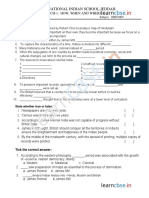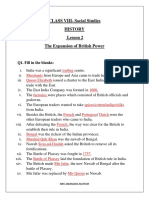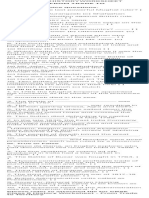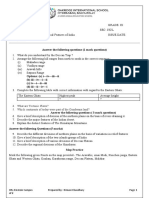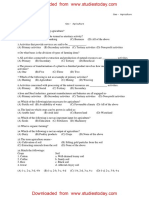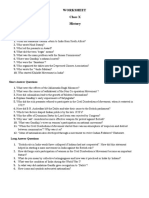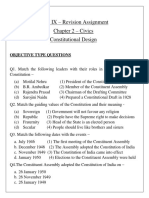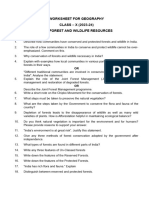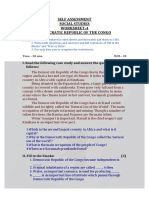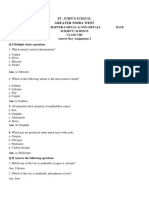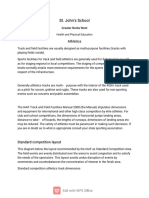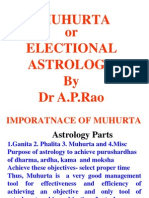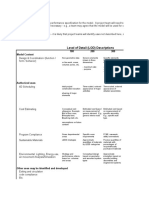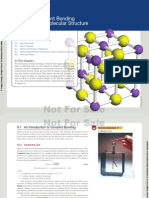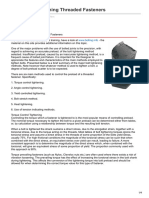0%(1)0% found this document useful (1 vote)
5K viewsClass Viii ASSIGNMENT 1 (Answer Key)
Class Viii ASSIGNMENT 1 (Answer Key)
Uploaded by
India Tech with AstitvaThis document contains a history assignment with 10 questions and answers about key concepts in Indian history. It defines history as a record of past events and explains how Indian history is typically periodized into ancient, medieval, and modern periods. It also discusses how the British conducted various surveys during their rule and preserved official documents to serve as records and references. Finally, it notes that official records do not always tell the full story and may hide certain truths.
Copyright:
© All Rights Reserved
Available Formats
Download as PDF, TXT or read online from Scribd
Class Viii ASSIGNMENT 1 (Answer Key)
Class Viii ASSIGNMENT 1 (Answer Key)
Uploaded by
India Tech with Astitva0%(1)0% found this document useful (1 vote)
5K views3 pagesThis document contains a history assignment with 10 questions and answers about key concepts in Indian history. It defines history as a record of past events and explains how Indian history is typically periodized into ancient, medieval, and modern periods. It also discusses how the British conducted various surveys during their rule and preserved official documents to serve as records and references. Finally, it notes that official records do not always tell the full story and may hide certain truths.
Original Title
1587105635545_Class_8_History_Chapter1_Assignment_Sheet_(Answer_Key)
Copyright
© © All Rights Reserved
Available Formats
PDF, TXT or read online from Scribd
Share this document
Did you find this document useful?
Is this content inappropriate?
This document contains a history assignment with 10 questions and answers about key concepts in Indian history. It defines history as a record of past events and explains how Indian history is typically periodized into ancient, medieval, and modern periods. It also discusses how the British conducted various surveys during their rule and preserved official documents to serve as records and references. Finally, it notes that official records do not always tell the full story and may hide certain truths.
Copyright:
© All Rights Reserved
Available Formats
Download as PDF, TXT or read online from Scribd
Download as pdf or txt
0%(1)0% found this document useful (1 vote)
5K views3 pagesClass Viii ASSIGNMENT 1 (Answer Key)
Class Viii ASSIGNMENT 1 (Answer Key)
Uploaded by
India Tech with AstitvaThis document contains a history assignment with 10 questions and answers about key concepts in Indian history. It defines history as a record of past events and explains how Indian history is typically periodized into ancient, medieval, and modern periods. It also discusses how the British conducted various surveys during their rule and preserved official documents to serve as records and references. Finally, it notes that official records do not always tell the full story and may hide certain truths.
Copyright:
© All Rights Reserved
Available Formats
Download as PDF, TXT or read online from Scribd
Download as pdf or txt
You are on page 1of 3
x ST.
JOHN’S SCHOOL
GREATER NOIDA WEST
SUBJECT: SOCIAL SCIENCE
HISTORY CHAPTER 1:- How, When and Where?
CLASS VIII
ASSIGNMENT 1 (Answer Key)
Q1. Define the word “History”.
A1. History “is a record of all known past events.”
Q2. Why do we relate dates with History?
A2. We relate dates with history as they give detail account of big events like
battles, wars, succession of a ruler etc.
Q3. Who was the first Governor- General of India?
A3.Warren Hastings was the first Governor General of India
Q4. How do we periodise Indian History?
A4.
a) In 1987, James Mill, a Scottish economist and political philosopher,
published a massive three volume work ‘A History of British India’
b) In this, he divided Indian history into three periods – Hindu, Muslim and
British
c) Historians have divided Indian History into ancient, medieval and modern
history
Q5. What is archieve?
A5. It is a collection of documents and data kept for historical purposes.
Q6. What kind of surveys were conducted by the British?
A6. The British conducted surveys related to –
a) revenue collection
b) quality of land
c) flora and fauna
d) local history
Q7. Why did the British preserve official documents?
A7. The British preserved the official documents because-
a) They served as records of what the officials thought, what they were
interested in and what they wished for.
b) Writing was more important speaking.
c) The documents in achieves and museums could be utilized for reference in
future.
d) Serves as an information or proof of any decision or action taken.
Q8. What is colonisation?
A8. When the subjugation of one country by another country leads to change in
social, culture, economic and political sphere,it leads to colonisation.
Q9. By what criteria do we choose a set of dates as important?
A9. The criteria on which we choose a set of date as important are:-
1. Selection of date depends on the story of past.
2. Focusing on a particular set of events is important.
3. By studying the dates reasons and consequences of events are understood in
better way.
Q10. What do official records not tell?
A10.
1. The official records do not tell about the needs of people of India.
2. Many official records hide the truth and only show one aspect of the event.
3. The official records does not represent the fall outs of British administration
and also do not represent the reactions and situation of Indians of every
sphere of society.
You might also like
- Cambridge Technicals Level 3 IT Hodder Education (2016)Document387 pagesCambridge Technicals Level 3 IT Hodder Education (2016)Bricious Mulimbi67% (3)
- Air Class 7 MCQS Questions With AnswersDocument2 pagesAir Class 7 MCQS Questions With AnswersKalai Selvi MohanNo ratings yet
- CBSE Class 7 History Worksheets (11) - Towns, Traders and CraftspersonsDocument5 pagesCBSE Class 7 History Worksheets (11) - Towns, Traders and CraftspersonsrachanaNo ratings yet
- Cbse Class 8 History Worksheet How When and WhereDocument2 pagesCbse Class 8 History Worksheet How When and Wherearul67% (18)
- Class V SST-Ch-16. India Wins FreedomDocument2 pagesClass V SST-Ch-16. India Wins Freedomemailgroup12100% (2)
- India - Size and LocationDocument4 pagesIndia - Size and LocationSocialscience4u.blogspot.com100% (1)
- Social Science Understanding Secularism Class 8 Cbse AssignmentDocument1 pageSocial Science Understanding Secularism Class 8 Cbse Assignmentgurdeepsarora8738No ratings yet
- CLASS VIII-Social Studies History Lesson 2 The Expansion of British PowerDocument12 pagesCLASS VIII-Social Studies History Lesson 2 The Expansion of British PowerShubham SinghalNo ratings yet
- Class 8 Civics Chapter 3 Extra Questions and Answers Why Do We Need A ParliamentDocument7 pagesClass 8 Civics Chapter 3 Extra Questions and Answers Why Do We Need A ParliamentTanuj100% (1)
- CBSE Class 8 History From Trade To Territory Worksheet Set CDocument1 pageCBSE Class 8 History From Trade To Territory Worksheet Set Cshashwat777100% (1)
- in The Earliest Cities Class 6 Worksheet History Chapter 3Document3 pagesin The Earliest Cities Class 6 Worksheet History Chapter 3Kusuma HaranathNo ratings yet
- Panchayati Raj Worksheet Vi ADocument3 pagesPanchayati Raj Worksheet Vi AKashvi Bhasin100% (2)
- Ch-1 Understanding Diversity Extra Questions-1Document2 pagesCh-1 Understanding Diversity Extra Questions-1Bhavna DixitNo ratings yet
- SA-2 Revision Worksheet Grade 9 - Physical Features of IndiaDocument2 pagesSA-2 Revision Worksheet Grade 9 - Physical Features of IndiaHimani Chaudhary100% (3)
- Extra Questions Class 8 Chapter 5 When People Rebel 1857Document12 pagesExtra Questions Class 8 Chapter 5 When People Rebel 1857Yuvraj SinghNo ratings yet
- CBSE Class 9 Geography WorksheetDocument1 pageCBSE Class 9 Geography WorksheetShweta Jain67% (3)
- From Gathering To Growing Food Worksheet 1Document2 pagesFrom Gathering To Growing Food Worksheet 1SuvashreePradhanNo ratings yet
- CBSE Class 8 Social Science Worksheet - Modern IndiaDocument2 pagesCBSE Class 8 Social Science Worksheet - Modern IndiaRoushan83% (6)
- CBSE Class 8 Geography Worksheet - AgricultureDocument4 pagesCBSE Class 8 Geography Worksheet - Agriculturevarsham271% (7)
- Social Science Worksheet Date: Name: - Grade: VII TOPIC: HISTORY: LN 8 Devotional Paths To The DivineDocument3 pagesSocial Science Worksheet Date: Name: - Grade: VII TOPIC: HISTORY: LN 8 Devotional Paths To The DivineSridevi Social ScienceNo ratings yet
- Class-Ix Geography Assignment-3 TOPIC-DrainageDocument2 pagesClass-Ix Geography Assignment-3 TOPIC-DrainageSoumitraBag100% (1)
- Worksheet Class X History: Chapter - Nationalism in India. Very Short Answer Type QuestionsDocument1 pageWorksheet Class X History: Chapter - Nationalism in India. Very Short Answer Type QuestionsRamanpreet KaurNo ratings yet
- Worksheet On Natural Vegetation and WildlifeDocument3 pagesWorksheet On Natural Vegetation and Wildlifekranthi macharapu100% (1)
- India-Size and Location Class 9 Extra Questions Social Science Geography Chapter 1Document5 pagesIndia-Size and Location Class 9 Extra Questions Social Science Geography Chapter 1Bijay Ketan MiahraNo ratings yet
- CBSE Class 10 Geography WorksheetDocument3 pagesCBSE Class 10 Geography WorksheetSagar NaikNo ratings yet
- SELF ASSESSMENT WORKSHEET For CLASS 9. Geography, Chapter 4, CLIMATEDocument8 pagesSELF ASSESSMENT WORKSHEET For CLASS 9. Geography, Chapter 4, CLIMATEVinayak Parashar100% (1)
- D.A.V.Public School Safilguda QUESTION BANK 2018-2019Document3 pagesD.A.V.Public School Safilguda QUESTION BANK 2018-201919.M. PURNATEJA 9BNo ratings yet
- Class9 Extra Questions For CHPT 1 Economics PDFDocument6 pagesClass9 Extra Questions For CHPT 1 Economics PDFMuskan Batra50% (4)
- Class 8 Judiciary Assignment Sheet AnswersDocument3 pagesClass 8 Judiciary Assignment Sheet AnswersIndia Tech with Astitva67% (3)
- CBSE Class 7 History WorksheetDocument1 pageCBSE Class 7 History WorksheetNisha Singh33% (3)
- Agriculture Class 8 Extra Questions and Answer Geography Chapter 4 Very Short Answers TypeDocument19 pagesAgriculture Class 8 Extra Questions and Answer Geography Chapter 4 Very Short Answers TypeTanuj67% (3)
- CBSE Class 8 Civics Worksheet - All ChaptersDocument2 pagesCBSE Class 8 Civics Worksheet - All Chaptersatulcoldwar100% (1)
- Class7 Worksheet 2Document2 pagesClass7 Worksheet 2sanjeetsks75% (4)
- Social Science Class Viii WORKSHEET-1-Map WorkDocument2 pagesSocial Science Class Viii WORKSHEET-1-Map WorkChahal Jain100% (1)
- The Land of Ice and Snow - GreenlandDocument8 pagesThe Land of Ice and Snow - Greenlandmeera2k100% (1)
- CBSE Class 8 Geography Worksheet - All ChaptersDocument15 pagesCBSE Class 8 Geography Worksheet - All Chapterssana0% (2)
- Delhi Public School Bangalore - East Social Studies Topic - The Land of Sand Class: V Questions and AnswersDocument6 pagesDelhi Public School Bangalore - East Social Studies Topic - The Land of Sand Class: V Questions and AnswersSrishti Ranjan100% (1)
- Class IX - Revision Assignment Chapter 2 - Geography Physical Features of IndiaDocument4 pagesClass IX - Revision Assignment Chapter 2 - Geography Physical Features of IndiaAaryan Leekha100% (1)
- MCQ Questions For Class 7 Geography Chapter 1 Environment With AnswersDocument1 pageMCQ Questions For Class 7 Geography Chapter 1 Environment With AnswersSwapna vani100% (2)
- Democratic Rights WorksheetDocument3 pagesDemocratic Rights WorksheetRAMAN VERMANo ratings yet
- Class IX - Revision Assignment Chapter 2 - Civics Constitutional DesignDocument5 pagesClass IX - Revision Assignment Chapter 2 - Civics Constitutional DesignTanishq vatsNo ratings yet
- Class 4 EVS - TEA 2 - Revision Worksheet 6Document3 pagesClass 4 EVS - TEA 2 - Revision Worksheet 6Adharva Raj 7 A Anika Raj 3 F100% (2)
- CBSE Class 8 Geography Worksheet - IndustriesDocument5 pagesCBSE Class 8 Geography Worksheet - Industriessana80% (5)
- Class-IX Ch-1 Assign HistoryDocument10 pagesClass-IX Ch-1 Assign HistorySujitnkbps100% (4)
- From Gathering To Growing Food Worksheet 2Document2 pagesFrom Gathering To Growing Food Worksheet 2SuvashreePradhan0% (1)
- CBSE Class 6 History All Chapter WorksheetsDocument11 pagesCBSE Class 6 History All Chapter Worksheetsyv34502100% (1)
- Civilizing The Native Educating The Nation 1Document22 pagesCivilizing The Native Educating The Nation 1rajesh dua50% (2)
- Chapter 19 Struglles Towards Freedom Class 5 PDFDocument4 pagesChapter 19 Struglles Towards Freedom Class 5 PDFSuvashreePradhanNo ratings yet
- Diversity and Discrimination Worksheet 1Document2 pagesDiversity and Discrimination Worksheet 1SuvashreePradhan100% (1)
- CBSE Class 5 Social Science - Land of Sand, Saudi Arabia.Document2 pagesCBSE Class 5 Social Science - Land of Sand, Saudi Arabia.Kiran Dadlani Harjani67% (9)
- Worksheet For Geography - CH 2. Forest and Wildlife ResourcesDocument1 pageWorksheet For Geography - CH 2. Forest and Wildlife Resourceskobayashirei602No ratings yet
- Question - Answers of The Democratic Republic of CongoDocument2 pagesQuestion - Answers of The Democratic Republic of CongoRuchi Pandey100% (3)
- CBSE Class 9 Civics Worksheet PDFDocument1 pageCBSE Class 9 Civics Worksheet PDFRajesh KumarNo ratings yet
- Class V Social Studies Worksheet 4Document2 pagesClass V Social Studies Worksheet 4Rashi Baksh100% (1)
- Why Democracy What Democracy WorksheetDocument2 pagesWhy Democracy What Democracy Worksheetkarthikeyan v100% (1)
- Class 8 History Chapter 1 MCQsDocument2 pagesClass 8 History Chapter 1 MCQsprijesh003No ratings yet
- Worksheet 1 Class: Vii Subject:Science Chapter: Nutrition in PlantsDocument5 pagesWorksheet 1 Class: Vii Subject:Science Chapter: Nutrition in PlantsTulasi NarayanamNo ratings yet
- Question AnswersDocument4 pagesQuestion AnswersSmita Chandra0% (3)
- Resource 20240413152819 8 Checked His L - 1 2024Document4 pagesResource 20240413152819 8 Checked His L - 1 2024DEVANSH BHATTNo ratings yet
- 8 His CH 1Document5 pages8 His CH 1ShaliniNo ratings yet
- How, When and WhereDocument24 pagesHow, When and WhereAanya Bhatnagar100% (1)
- ST - John'S School Greater Noida West Subject: Science CLASS IX: BIOLOGY (2020 - 21) Chapter - 6 Tissues (Answer Key - 2)Document6 pagesST - John'S School Greater Noida West Subject: Science CLASS IX: BIOLOGY (2020 - 21) Chapter - 6 Tissues (Answer Key - 2)India Tech with AstitvaNo ratings yet
- St. John'S School Greater Noida WestDocument2 pagesSt. John'S School Greater Noida WestIndia Tech with AstitvaNo ratings yet
- St. John'S School Greater Noida WestDocument3 pagesSt. John'S School Greater Noida WestIndia Tech with AstitvaNo ratings yet
- Very Short Answer Type Questions Class IXDocument4 pagesVery Short Answer Type Questions Class IXIndia Tech with AstitvaNo ratings yet
- Class 8 History Chapter1 Assignment SheetDocument1 pageClass 8 History Chapter1 Assignment SheetIndia Tech with Astitva100% (1)
- Class 8 History Chapter1 Part1 NotesDocument3 pagesClass 8 History Chapter1 Part1 NotesIndia Tech with AstitvaNo ratings yet
- Class 8 Hist Rebel NotesDocument4 pagesClass 8 Hist Rebel NotesIndia Tech with Astitva100% (1)
- It So Happened Notes CH.2 Children at WorkDocument1 pageIt So Happened Notes CH.2 Children at WorkIndia Tech with AstitvaNo ratings yet
- St. John'S School Greater Noida West: Chapter-1 Crop Production and Management Date Notes Subject-Science Class-ViiiDocument3 pagesSt. John'S School Greater Noida West: Chapter-1 Crop Production and Management Date Notes Subject-Science Class-ViiiIndia Tech with AstitvaNo ratings yet
- Athletics Track EventDocument6 pagesAthletics Track EventIndia Tech with AstitvaNo ratings yet
- Class 8 Judiciary Assignment Sheet AnswersDocument3 pagesClass 8 Judiciary Assignment Sheet AnswersIndia Tech with Astitva67% (3)
- Alai DarwazaDocument1 pageAlai DarwazaIndia Tech with Astitva0% (1)
- St. John'S School Greater Noida WestDocument3 pagesSt. John'S School Greater Noida WestIndia Tech with AstitvaNo ratings yet
- How To Choose MuhurtamDocument52 pagesHow To Choose Muhurtamprk.sandeep724275% (4)
- Theory of FlightDocument90 pagesTheory of FlightJohanNo ratings yet
- Semrock v. Edmund OpticsDocument9 pagesSemrock v. Edmund OpticsPatent LitigationNo ratings yet
- Math 8Document4 pagesMath 8myspg0336No ratings yet
- Tiếng Anh 6 Smart World - Unit 1 TestDocument4 pagesTiếng Anh 6 Smart World - Unit 1 TestNguyet Anh100% (1)
- Model Progression Matrix v4 0Document10 pagesModel Progression Matrix v4 0Nagarjuna Reddy MNo ratings yet
- Evolution of Thermally Induced White Etching Layer at Rail Surface During Multiple Wheel - Train PassagesDocument13 pagesEvolution of Thermally Induced White Etching Layer at Rail Surface During Multiple Wheel - Train Passagesanime MAVCNo ratings yet
- University of Northern Philippines: WWW - Unp.edu - PH CP# 09177148749, 09175785986Document23 pagesUniversity of Northern Philippines: WWW - Unp.edu - PH CP# 09177148749, 09175785986Hanna La MadridNo ratings yet
- Industrial Training ReportDocument28 pagesIndustrial Training ReportIdowu OjoNo ratings yet
- Airfield Components and LightingsDocument10 pagesAirfield Components and Lightingsrmaffireschool100% (2)
- PF - SPB Form: Pt. Orela ShipyardDocument1 pagePF - SPB Form: Pt. Orela ShipyardJOHAN SIAHAANNo ratings yet
- Chemistry Owl Book Chapter 8Document40 pagesChemistry Owl Book Chapter 8JoeNo ratings yet
- AIMO 2016 Trial G7 PaperDocument4 pagesAIMO 2016 Trial G7 PaperHary PurbowoNo ratings yet
- Astronomy: Branch of Astronomy Field of AstronomyDocument14 pagesAstronomy: Branch of Astronomy Field of AstronomyAnnNo ratings yet
- Introduction To Environmental Science ScriptDocument5 pagesIntroduction To Environmental Science ScriptJaffy BustamanteNo ratings yet
- Miles Mathis - Ballooning Spiders As Proof of My Charge FieldDocument3 pagesMiles Mathis - Ballooning Spiders As Proof of My Charge FieldEvgyrt NesralNo ratings yet
- Poison Potion: Item Type Price Per Dose Item Rarity Price Per DoseDocument1 pagePoison Potion: Item Type Price Per Dose Item Rarity Price Per DoseJeanPhilipNo ratings yet
- Dnet Techbible 3 14 2007Document409 pagesDnet Techbible 3 14 2007guinho_17No ratings yet
- BoilersDocument37 pagesBoilersSumaira KhanNo ratings yet
- KEE 201 PPT Unit 5 Electrical Installations 1Document38 pagesKEE 201 PPT Unit 5 Electrical Installations 1sandy boy2No ratings yet
- CTC 070 AnswerbookDocument55 pagesCTC 070 AnswerbookGoutam SahaNo ratings yet
- RM400 Wear Part TrainingDocument18 pagesRM400 Wear Part TrainingMp pmNo ratings yet
- Chapter 1 An Introduction To Cybercrimes and Environmental Laws and ProtectionDocument6 pagesChapter 1 An Introduction To Cybercrimes and Environmental Laws and Protectionjoven balisiNo ratings yet
- ELO - ENGG. DEV. Sept.2018Document19 pagesELO - ENGG. DEV. Sept.2018Prathamesh Pradeep MashilkarNo ratings yet
- Manufacturing Engineering Forming: Chapter 3: MetalDocument98 pagesManufacturing Engineering Forming: Chapter 3: MetalnunuNo ratings yet
- Hurler Syndrome - EvangelistaDocument10 pagesHurler Syndrome - EvangelistaGabrielle EvangelistaNo ratings yet
- Manual Discover 150 SDocument80 pagesManual Discover 150 SStef Incio17% (6)
- Chola MS: Motor Policy Schedule Cum Certificate of InsuranceDocument2 pagesChola MS: Motor Policy Schedule Cum Certificate of InsuranceAnil SharmaNo ratings yet
- Methods of Tightening Threaded FastenersDocument4 pagesMethods of Tightening Threaded FastenersABDONo ratings yet



